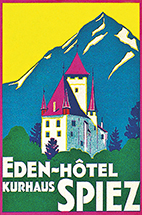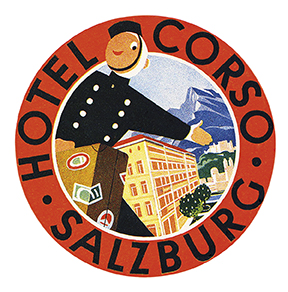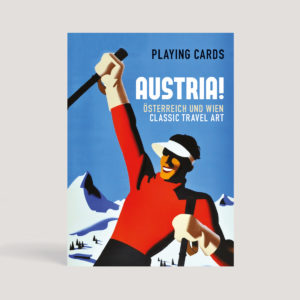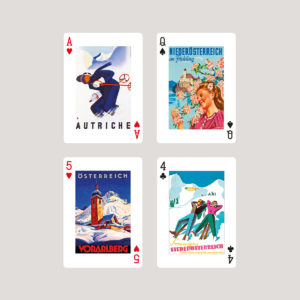A VERY BRIEF HISTORY OF AUSTRIA
Austria’s history is rich and complex. Tiny (the size of Maine, with a population of 9 million) compared to her powerful neighbours, she has inevitably looked warily east towards Russia and west towards Germany. The Anschluss of 1938, the annexation of Austria into Nazi Germany, though popular with most Austrians at the time, was a calamity. The union of German speaking peoples had been a utopian dream but Hitler, albeit Austrian, brought merely destruction. Austria had lost everything after defeat in the Great War (partly started by her own crass diplomacy): empire, monarchy, land, army, currency – hyperinflation wiped out savings. Loss of independence in 1938 meant another disastrous war. Austrian anti-Nazis tried to surrender Vienna to the Russians in 1945 but were shot by the SS. The old city suffered terribly in the assault.
POST-WAR
 After WW2, Austria was occupied by the victors and didn’t get full independence until 1955 – which ushered in a tense period of pragmatic government; remaining neutral (neither in Nato nor the Russian dominated Warsaw Pact) yet punching above her weight internationally, both politically and morally, not least through the skill of her socialist Chancellor Bruno Kreisky. That Austria (eventually) prospered is due both to the US Marshall Plan and the determination of her people. The Marshall Plan saved Austria from division, and from communism. Austria remained a bulwark against the Russian bear.
After WW2, Austria was occupied by the victors and didn’t get full independence until 1955 – which ushered in a tense period of pragmatic government; remaining neutral (neither in Nato nor the Russian dominated Warsaw Pact) yet punching above her weight internationally, both politically and morally, not least through the skill of her socialist Chancellor Bruno Kreisky. That Austria (eventually) prospered is due both to the US Marshall Plan and the determination of her people. The Marshall Plan saved Austria from division, and from communism. Austria remained a bulwark against the Russian bear.
EARLY HISTORY
Celtic tribes occupied the region of Austria until conquered by the Romans. When the Roman Empire collapsed (Rome fell in 476 AD) it was ruled by local tribes again until 788 when Charlemagne defeated them. It became known as Austria in 976 when it was ruled by Leopold of Babenberg. In 1276, Rudolf I became the first Habsburg, a dynasty that reigned for the next 750 years. It was an empire stretching well beyond Austria’s current borders, dominating Central Europe for centuries. The Hapsburgs were not exactly fluffy, but Europe should be grateful to these robust soldiers and statesmen: twice the Ottomans tried to take Vienna (1529 and 1683) and twice they were repulsed.
An Austrian defeat would have threatened the whole of western Europe.
METTERNICH
The early 19C was dominated by the diplomacy of Prince Metternich, who – first as Foreign Secretary then as Chancellor – cemented the coalitions that defeated Napoleon and created the ‘balance of power’ that kept the peace for decades. He crushed nationalist movements by liberal use of spies and censorship. In 1848 Franz Josef I became Emperor (and King of Hungary, King of Bohemia, and numerous states of the Austro-Hungarian Empire) until his death in 1916. His main achievement was to grant greater autonomy to Hungary and transform the Austrian Empire into the Dual Monarchy of Austria-Hungary. His life was tragic: his brother was executed and his wife murdered; his only son killed himself and his nephew’s assassination sparked WW1.
CULTURE
 Austrian art and music, Austrian culture, thrived though political upheavals. Her culture is both diverse and contradictory. The fripperies of the Strauss father and son, of Lehár, are enjoyed as much as Mozart and Haydn, or the genius of Schubert, Mahler and the revolutionary Schoenberg. Vienna was for 35 years the focus of Beethoven’s work. As the world edged toward war the Wiener Werkstätte (‘Vienna Workshop’) was established in Vienna (1903), an Arts and Crafts cooperative of artisans, designers and painters that anticipated Warhol’s blurring of art and design, of art and commerce. They turned out brilliant postcards that were collectable and affordable. The movement grew out of the Vienna Secession, formed in 1897 by a group of Austrian painters, sculptors and architects who had resigned from the official academy. Their first president was Gustav Klimt. Buildings became objets d’art; art and music were everywhere, not just in the galleries and museums and opera house but in the cafés. Austrian cinema has given us Lang, Pabst and the incomparable Billy Wilder.
Austrian art and music, Austrian culture, thrived though political upheavals. Her culture is both diverse and contradictory. The fripperies of the Strauss father and son, of Lehár, are enjoyed as much as Mozart and Haydn, or the genius of Schubert, Mahler and the revolutionary Schoenberg. Vienna was for 35 years the focus of Beethoven’s work. As the world edged toward war the Wiener Werkstätte (‘Vienna Workshop’) was established in Vienna (1903), an Arts and Crafts cooperative of artisans, designers and painters that anticipated Warhol’s blurring of art and design, of art and commerce. They turned out brilliant postcards that were collectable and affordable. The movement grew out of the Vienna Secession, formed in 1897 by a group of Austrian painters, sculptors and architects who had resigned from the official academy. Their first president was Gustav Klimt. Buildings became objets d’art; art and music were everywhere, not just in the galleries and museums and opera house but in the cafés. Austrian cinema has given us Lang, Pabst and the incomparable Billy Wilder.
AUSTRIA AND GERMANY
Austria shares a language with Germany but not an outlook. Affability is important in Austria – a jovial and irrelevant discussion about life and football precedes business. Sometimes business is omitted, not always on purpose but due to schnapps. Lebensfreude, the enjoyment of life, comes before commerce. Eating and drinking and whooshing downhill on skis are paramount, as the brilliant posters in this pack attest. An old Austrian joke is that Germans would like to understand Austrians but can’t, and Austrians understand Germans but would rather not. ‘More Germans live in Austria than Turks now,’ one Austrian told me, ‘and most tourists are German, so we better rub along. They come to let their hair down and share a whole bottle of wine between six.’ A German conceded that the Austrian has a refined sense of humour. ‘You’ve only got to see a middle-aged Austrian couple in lederhosen and dirndl to know they can laugh at themselves.’


